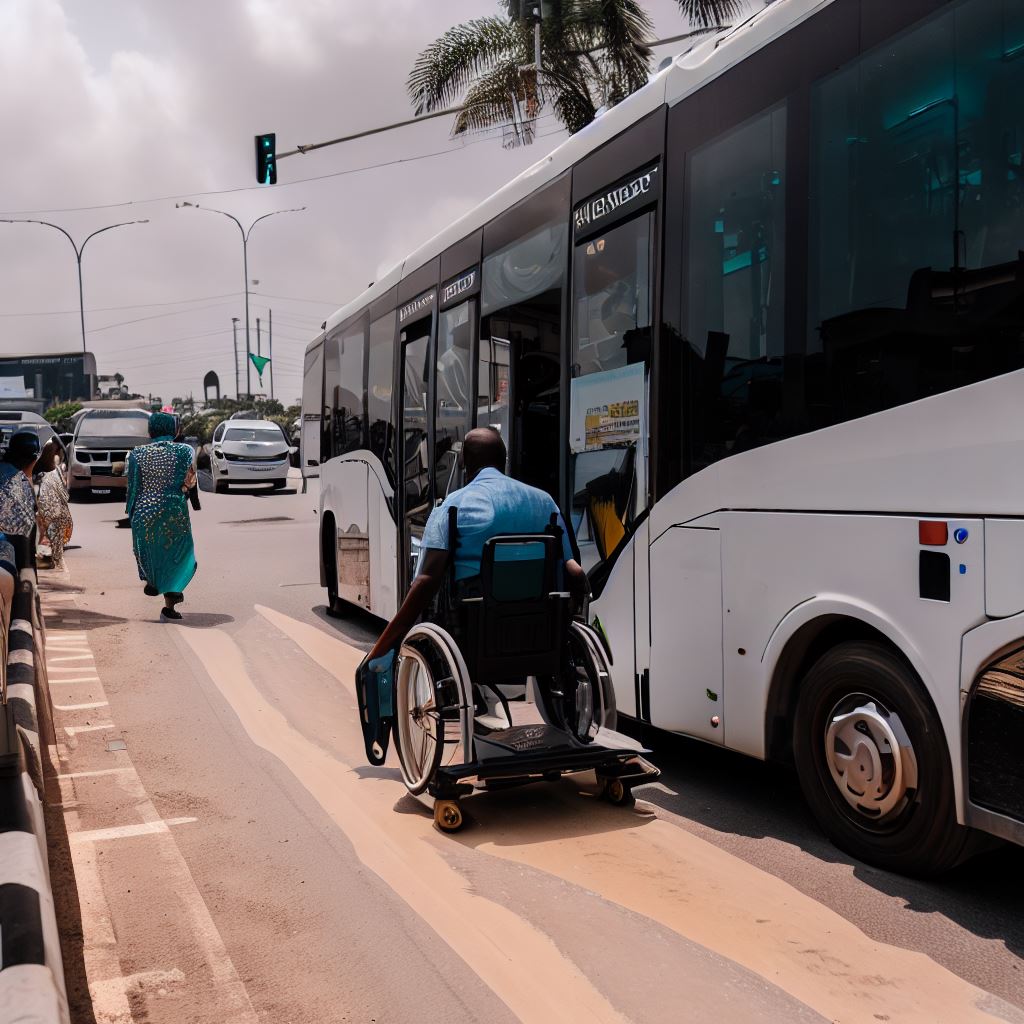Introduction
Accessibility in transit refers to the ease of use and availability of transportation services for individuals with disabilities.
It is crucial because it ensures equal opportunities for all in terms of mobility, independence, and participation in society.
In Nigeria, approximately 25 million people are living with disabilities, making up about 15% of the population.
Addressing their transportation needs is essential to promote inclusivity and ensure their right to access essential services, education, employment, and social activities.
Challenges Faced by Disabled Individuals in Accessing Transit in Nigeria
A. Lack of inclusive infrastructure and transportation systems
The first challenge faced by disabled individuals in accessing transit in Nigeria is the lack of inclusive infrastructure and transportation systems.
Many roads, sidewalks, and public transportation stations are not designed to accommodate the needs of disabled individuals.
This creates barriers for them to move around independently and access public transportation services.
B. Inadequate public transportation options for the disabled
Another challenge is the inadequate public transportation options available for disabled individuals in Nigeria.
The majority of public transportation vehicles, such as buses and taxis, are not equipped with wheelchair ramps or lifts.
This makes it difficult for wheelchair users to board and disembark from these vehicles, limiting their ability to use public transportation.
C. Limited accessibility features in existing transportation modes
The limited availability of accessibility features in existing transportation modes further exacerbates the challenges faced by disabled individuals.
For instance, many train stations and bus stops lack proper signage and information in Braille for visually impaired individuals.
This makes it difficult for them to navigate and locate the correct transportation routes.
D. Social stigma and discrimination faced by disabled individuals when using public transport
Lastly, disabled individuals in Nigeria often face social stigma and discrimination when using public transport.
Disabled individuals in Nigeria often contend with negative attitudes and prejudices from the general public, which can lead to feelings of discomfort and exclusion.
These societal barriers can discourage them from utilizing public transportation services, ultimately impeding their mobility and independence.
In summary, disabled individuals in Nigeria confront a multitude of challenges when attempting to access transit.
These challenges encompass the lack of inclusive infrastructure and transportation systems, limited public transportation options, insufficient accessibility features, and the burden of social stigma.
Addressing these issues necessitates a concerted effort from the government and transportation authorities to prioritize the needs of disabled individuals.
Proactive measures should be taken to enhance accessibility and inclusivity in public transportation systems.
This can involve implementing infrastructure upgrades, offering accessible transportation options, improving signage and information dissemination in various formats, and launching awareness campaigns to eradicate social stigma and discrimination.
By taking such steps, Nigeria can ensure that all its citizens, regardless of their abilities, enjoy equal access to public transportation services and have the opportunity to fully participate in society.
Read: Sound Engineering Tech Trends in Nigeria
Initiatives and Efforts Made to Improve Accessibility in Transit for the Disabled in Nigeria
A. Introduction of Accessible Public Transportation Services
Several initiatives have been taken to enhance the accessibility of public transportation services for disabled individuals in Nigeria.
These initiatives aim to provide equal opportunities for all citizens, regardless of their physical abilities.
The Lagos State government, for example, has introduced accessible buses equipped with ramps and designated seating areas for people with disabilities.
These buses are designed to accommodate wheelchair users and provide easier boarding and alighting options.
Similarly, the Abuja Urban Mass Transport Company (AUMTCO) has also launched accessible buses with wheelchair ramps and priority seating for disabled passengers.
These initiatives make it convenient and safe for disabled individuals to travel on public transportation.
B. Implementation of Inclusive Infrastructure and Facilities
In addition to accessible transportation services, efforts have been made to create inclusive infrastructure and facilities to enhance accessibility in transit for the disabled.
For instance, the Lagos State government has implemented the “Access Lagos” program, which focuses on making public spaces and transportation infrastructure accessible for disabled individuals.
This program includes the construction of accessible sidewalks, ramps, and tactile pavements to aid visually impaired commuters.
Furthermore, newly constructed bus stops and terminals in Nigeria are designed with accessibility features such as ramps, elevators, and tactile paths for the visually impaired.
These inclusive infrastructure projects enable disabled individuals to move independently and safely within transit systems.
C. Awareness Campaigns and Advocacy for the Rights of Disabled Individuals in Transit
To promote inclusivity and heighten awareness regarding the rights of disabled individuals in transit, a multitude of awareness campaigns and advocacy initiatives have been launched in Nigeria.
Prominent organizations like the Centre for Citizens with Disabilities (CCD) and Inclusive Friends Association (IFA) have been at the forefront of campaigning for accessible transportation systems.
Their efforts are dedicated to educating both the public and government officials about the critical significance of inclusive transit.
Simultaneously, they advocate for policies and regulations that safeguard the rights of disabled individuals.
These impactful awareness campaigns serve as catalysts for changing societal attitudes towards disability.
Their ultimate aim is to cultivate a more inclusive and accessible environment that benefits all individuals in transit.
D. Partnerships with Disability Organizations and Government Agencies
Partnerships between disability organizations and government agencies play a crucial role in improving accessibility in transit for disabled individuals in Nigeria.
Government agencies, including the Federal Ministry of Transportation and the National Commission for Persons with Disabilities, collaborate closely with disability organizations.
Together, they design and implement inclusive policies, programs, and infrastructure projects.
These collaborative efforts ensure that the concerns and needs of disabled individuals are not only acknowledged but also integrated into transportation planning and development.
By working synergistically, disability organizations and government agencies can foster the creation of sustainable and inclusive transit systems that cater comprehensively to the diverse needs of disabled individuals.
In fact, various initiatives and concerted efforts have been undertaken to enhance accessibility in transit for disabled individuals in Nigeria.
These encompass the introduction of accessible public transportation services, the implementation of inclusive infrastructure and facilities, awareness campaigns, and crucial partnerships with disability organizations and government agencies.
These steps collectively contribute to the overarching goal of building an inclusive society that genuinely accommodates the needs of all citizens, irrespective of their abilities.
Read: Networking for Sound Engineers in Nigeria

Gain More Insights: Certification for Event Managers: Nigeria’s Guide
Impact of Improved Accessibility in Transit for Disabled Individuals in Nigeria
A. Enhanced independence and mobility for the disabled population
- Accessible transit options will empower disabled individuals to move freely and independently.
- They can participate in daily activities, such as going to work or visiting friends and family.
- It eliminates the need for dependence on others, increasing their confidence and self-esteem.
- Improved accessibility in transit ensures the disabled population is not left behind or excluded.
- They can enjoy the same opportunities as everyone else, fostering a sense of empowerment.
B. Economic benefits and increased employment opportunities
- Accessible transit provides disabled individuals with better access to job opportunities.
- They can commute conveniently, expanding their employment options and contributing to the economy.
- Employers can also tap into the disabled talent pool, enhancing workplace diversity and productivity.
- Increased employment among disabled individuals leads to reduced reliance on welfare and improved financial stability.
C. Improved social inclusion and participation in community activities
- Accessible transit allows disabled individuals to actively participate in social and community activities.
- They can attend social gatherings, events, and join clubs or organizations without facing transport barriers.
- This fosters a sense of belonging and inclusion, reducing social isolation and loneliness.
- Disabled individuals can form connections, build networks, and engage in meaningful relationships.
D. Overall enhancement of the quality of life for disabled individuals
- Improved accessibility in transit directly contributes to an overall better quality of life for disabled individuals.
- It enables them to live more independently, have control over their daily activities, and pursue their goals.
- Easy access to transportation enhances access to healthcare, education, and recreational facilities.
- This leads to improved physical and mental well-being, resulting in a higher quality of life.
- Additionally, the inclusion of disabled individuals in society fosters a more inclusive and diverse community.
By prioritizing accessibility in transit, Nigeria can create a society that values and supports the disabled population.
Enhanced independence and mobility will empower disabled individuals to actively participate in economic, social, and community activities.
This, in turn, will lead to economic growth, better social inclusion, and an overall improved quality of life for disabled individuals.
It is crucial for policymakers, transportation authorities, and society as a whole to recognize the importance of accessibility in transit and take the necessary steps to implement inclusive transportation systems.
Read: Becoming a Wind Turbine Tech in Nigeria: A Step-by-Step Guide
Remaining Challenges and Future Considerations
A. Need for continuous improvements in infrastructure and transportation systems
Continuous improvements in infrastructure and transportation systems are necessary to ensure accessibility for disabled individuals in Nigeria.
This requires ongoing efforts to upgrade and maintain existing facilities, such as sidewalks, ramps, and public transportation vehicles.
Furthermore, the construction of new infrastructure must prioritize accessibility, incorporating features like elevators, escalators, and wheelchair-friendly entrances.
B. Developing and implementing comprehensive accessibility policies
To ensure the effective provision of accessible transit services, it is crucial for Nigeria to develop and implement comprehensive accessibility policies.
These policies should address the specific needs of disabled individuals, such as accessible boarding procedures, assistance services, and the availability of accessible restrooms.
Additionally, these policies should encompass all modes of public transportation, including buses, trains, and taxis.
C. Addressing financial constraints and resource allocation for accessibility projects
One of the key challenges in improving accessibility in transit is the limited availability of financial resources.
Nigeria needs to address these financial constraints and allocate sufficient funds for accessibility projects.
This includes securing government funding, seeking partnerships with private entities, and exploring international grants and loans specifically designated for improving accessibility.
D. Ongoing awareness and education for the general public regarding disability issues
Foster ongoing awareness and education for inclusive transit, involving the public in disability issues.
Educate Nigerians on disabled individuals’ rights, barriers to transportation through campaigns, schools, and community initiatives.
Use campaigns, social media, and events to promote inclusivity in accessible transit.
Incorporate disability awareness in school curricula to teach children about challenges faced by disabled individuals.
Engage with disability rights groups, host workshops, and public discussions for community awareness.
Nigeria must address challenges and consider the future to enhance transit accessibility.
Infrastructure improvements, policies, resource allocation, and public education will aid inclusivity in transit.
Prioritize accessible transit for equal opportunities and independence in Nigeria, regardless of disabilities.
Read: Sound Engineering: A Growing Field in Nigeria
Uncover the Details: Becoming a Fire Fighter: A Step-by-Step Guide in Nigeria
Conclusion
A. Importance of Accessibility in Transit
In Nigeria, ensuring transit accessibility for the disabled is not just a matter of convenience; it’s a fundamental human right.
Accessible transportation empowers individuals with disabilities, promoting independence and inclusion.
B. Continuing the Journey Towards Inclusivity
The path to making transit more inclusive and accessible in Nigeria is ongoing.
It requires collaborative efforts from government agencies, transportation providers, and society as a whole.
Let’s persist in our commitment to breaking down barriers and ensuring that every citizen can move freely and independently.
Together, we can create a more inclusive and accessible transportation system for all.




